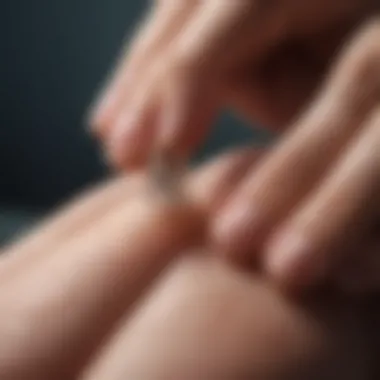Expert Insight: Who Can Help with Ingrown Toenail Issues?


People experiencing issues with ingrown toenails may seek assistance from various professionals, each with their specialized expertise in addressing and treating this common foot condition. Podiatrists, dermatologists, general practitioners, and nail technicians play crucial roles in providing effective solutions for ingrown toenails, ensuring optimal foot health. Understanding the distinct approaches and skills of these experts can lead to informed decisions when seeking help for this discomforting ailment.
Podiatrists - Foot Care Specialists
Podiatrists are highly trained medical professionals specializing in the diagnosis, treatment, and prevention of foot and ankle disorders, including ingrown toenails. With their in-depth knowledge of podiatric medicine and surgical procedures, podiatrists can offer a comprehensive assessment of the ingrown toenail, determining the underlying cause and recommending suitable treatment options. From conservative measures like nail trimming and proper footwear advice to more advanced interventions such as nail avulsion or surgery, podiatrists devise personalized care plans to address the specific needs of each patient.
Dermatologists - Skincare Experts
Dermatologists are physicians who specialize in diagnosing and treating conditions related to the skin, hair, and nails, making them valuable resources for individuals with recurring ingrown toenails. By examining the affected area and assessing the skin and nail health, dermatologists can provide insights into factors contributing to ingrown toenails, such as fungal infections or structural abnormalities. Through medical interventions like topical medications, steroid injections, or minimally invasive procedures, dermatologists can alleviate symptoms and promote healing, ensuring the long-term health of the toenails.
General Practitioners - Primary Care Physicians
General practitioners, commonly known as primary care physicians, are often the first point of contact for individuals seeking medical advice and treatment for various health concerns, including ingrown toenails. While general practitioners may not specialize in foot disorders like podiatrists or dermatologists, they can still offer initial assessment, basic management strategies, and referrals to relevant specialists if necessary. General practitioners focus on promoting overall wellness and may recommend conservative measures to relieve pain and prevent complications associated with ingrown toenails, fostering a multidisciplinary approach to patient care.
Nail Technicians - Beauty Professionals
Nail technicians, proficient in nail care and enhancement, can also provide assistance for individuals with ingrown toenails by offering grooming services and practical advice on nail maintenance. While not medical professionals, nail technicians can help individuals optimize their nail hygiene, shape their nails properly, and avoid practices that may exacerbate ingrown nails. By promoting healthy nail habits and recommending suitable nail products, nail technicians contribute to the well-being of their clients' toenails, complementing the efforts of medical experts in preventing and managing ingrown toenails.
Introduction
Understanding Ingrown Toenails
Causes of Ingrown Toenails


When it comes to the causes of ingrown toenails, improper nail trimming and wearing ill-fitting shoes are among the primary culprits. The curvature of the toenail or genetic predisposition can also contribute to this uncomfortable condition. Understanding the causes of ingrown toenails is essential as it helps individuals identify risk factors and take preventive measures to avoid recurrence. While some cases may require professional intervention, self-care strategies can often alleviate mild symptoms before they escalate.
Symptoms of Ingrown Toenails
Symptoms of ingrown toenails typically include pain, redness, swelling, and tenderness around the affected nail. In severe cases, pus or drainage may be present, indicating an infection. Recognizing these symptoms early on is crucial in seeking timely assistance and preventing complications. By addressing symptoms promptly, individuals can mitigate discomfort and reduce the likelihood of further complications, fostering better foot health in the long run.
Importance of Seeking Professional Help
Seeking professional help for ingrown toenails is paramount in ensuring proper management and treatment. Professionals like podiatrists possess specialized knowledge in foot care and can provide tailored solutions to address ingrown toenails effectively. Dermatologists offer medical interventions for complex cases, while general practitioners serve as initial points of contact for assessment and referrals to specialists. Nail technicians can also play a role in toe nail care by offering preventive advice and guidance on proper nail maintenance.
Professionals Who Can Assist
When faced with the discomfort and pain of an ingrown toenail, seeking assistance from specialized professionals becomes crucial. These experts offer valuable insights and tailored treatments to alleviate the condition effectively, promoting optimal foot health. Each type of professional brings a unique set of skills and approaches to the table, ensuring comprehensive care for individuals dealing with ingrown toenails.
Podiatrist
Specialized Training and Expertise
Podiatrists are extensively trained in the intricate complexities of foot health, with a focus on diagnosing and treating various conditions affecting the feet, including ingrown toenails. Their specialized training equips them with the knowledge and skills needed to provide precise and effective care for such issues. By choosing a podiatrist, individuals can benefit from their deep understanding of the biomechanics of the foot and expert handling of toenail-related concerns.
Treatment Methods
When it comes to treating ingrown toenails, podiatrists employ a range of methods tailored to the severity of the condition. From conservative approaches like soaks and proper trimming techniques to more advanced procedures such as nail removal or antibiotic therapy, podiatrists adapt their treatment plans to suit each individual's needs. This personalized approach ensures that patients receive appropriate care that addresses the root cause of their ingrown toenail.
Dermatologist


Role in Addressing Ingrown Toenails
Dermatologists play a significant role in addressing ingrown toenails by utilizing their expertise in skin and nail health. Their comprehensive knowledge of dermatological conditions enables them to identify underlying issues contributing to ingrown toenails and recommend suitable interventions. By involving dermatologists in the management of ingrown toenails, patients can benefit from a holistic approach that considers both the dermatological and podiatric aspects of the condition.
Medical Procedures Offered
In addition to diagnosing ingrown toenails, dermatologists offer a variety of medical procedures to treat the condition effectively. These may include surgical interventions to correct nail growth patterns, laser therapy to address infection or inflammation, or topical treatments to promote healing. With a focus on both therapeutic and cosmetic outcomes, dermatologists employ a range of interventions to alleviate discomfort and enhance the overall health of the affected toenail.
General Practitioner
Initial Assessment and Referrals
General practitioners play a crucial role in the initial assessment of ingrown toenails, offering a primary point of contact for individuals seeking treatment. Through thorough evaluations and examinations, general practitioners can determine the severity of the condition and refer patients to specialized professionals as needed. Their role in coordinating care ensures that individuals with ingrown toenails receive timely and appropriate interventions to manage their symptoms effectively.
Treatment Approaches
When it comes to addressing ingrown toenails, general practitioners may employ conservative treatment approaches to alleviate discomfort and promote healing. These may include recommending proper nail trimming techniques, advising on home care strategies, or prescribing topical medications to reduce inflammation. By collaborating with individuals and other healthcare providers, general practitioners play a vital role in managing ingrown toenails and preventing recurrent episodes.
Nail Technician
Role in Toe Nail Care
Nail technicians specialize in the aesthetic and practical aspects of nail care, offering services that contribute to overall foot health. While not trained to diagnose or treat medical conditions, nail technicians play a role in maintaining the health and appearance of toenails, including addressing ingrown toenails through proper trimming techniques and nail care practices.
Preventive Measures


In addition to promoting overall nail health, nail technicians provide guidance on preventive measures to minimize the risk of ingrown toenails. By educating clients on proper nail maintenance, footwear choices, and self-care practices, nail technicians empower individuals to take proactive steps in preventing ingrown toenails. Their emphasis on prevention complements the work of medical professionals, promoting long-term foot health and well-being.
Choosing the Right Professional
In this segment of the article, we delve into the paramount significance of selecting the right professional to address the issue of ingrown toenails effectively. Choosing the right professional can make a substantial difference in the outcome of treatment and the overall health of your feet. By opting for a specialist with in-depth knowledge and experience in managing ingrown toenails, individuals can benefit from tailored care and specialized expertise that can alleviate discomfort and prevent future complications.
When embarking on the journey of finding the ideal professional to assist with ingrown toenails, several critical elements merit consideration. The expertise and experience of the practitioner play a pivotal role in determining the efficacy of the treatment provided. Evaluating the track record of the professional, including their success rate in treating ingrown toenails and related complications, can offer invaluable insights into their level of competence and proficiency.
Factors to Consider
Expertise and Experience
The expertise and experience of a healthcare provider are essential factors to consider when seeking assistance for ingrown toenails. A practitioner with specialized training in podiatry or dermatology, coupled with a robust portfolio of successfully treated cases, can instill confidence in patients regarding the quality of care they will receive. This expertise enables professionals to accurately diagnose the underlying causes of ingrown toenails, devise targeted treatment plans, and execute procedures with precision, ensuring optimal outcomes for their patients.
Cost of Services
The cost of services is another critical aspect that individuals must weigh when selecting a professional to address ingrown toenails. While cost should not be the sole determining factor, it is important to assess whether the fees align with the quality of care provided. Understanding the pricing structure, potential insurance coverage, and payment options can help patients make informed decisions regarding their healthcare investment.
Location and Accessibility
The location and accessibility of the healthcare facility are practical considerations that can influence the overall treatment experience for individuals dealing with ingrown toenails. Proximity to the professional's office, ease of transportation, and availability of appointments can impact the continuity of care and promptness of interventions. Accessibility features such as wheelchair accessibility, parking facilities, and convenient office hours contribute to a patient-friendly environment and facilitate seamless engagement with the chosen professional.
Aligning these considerations with personal preferences and healthcare needs can empower individuals to make informed choices when selecting a professional to assist with ingrown toenails. By prioritizing expertise, weighing the costs effectively, and assessing location and accessibility factors, individuals can enhance their journey towards optimal foot health and well-being.
Conclusion
In the mosaic of professionals available to tackle ingrown toenails, each expert plays a critical role in ensuring optimal foot health. Podiatrists bring a specialized focus on foot and ankle health, with rigorous training equipping them to diagnose and treat various podiatric issues, including ingrown toenails. Their expertise extends to both conservative treatments, like nail trimming and orthotics, and surgical interventions when necessary, such as partial nail avulsion to prevent recurrences. Dermatologists, on the other hand, offer a unique perspective by addressing ingrown toenails from a dermatological standpoint, utilizing medical procedures like nail avulsion and antibiotics to alleviate symptoms and promote healing. General practitioners serve as the initial gateway to care, offering assessments and referrals to more specialized professionals like podiatrists and dermatologists as needed. Lastly, nail technicians play a crucial role in preventive care, advising on proper nail trimming techniques and suggesting measures to maintain healthy toenails. By harmonizing the contributions of these professionals, individuals can navigate the landscape of ingrown toenail treatment with confidence, ensuring timely and effective care.
Ensuring Foot Health
The cornerstone of preventing and managing ingrown toenails lies in comprehensive foot health practices. Regular inspection of the feet, particularly the toenails, can detect any early signs of ingrowth or infection. Proper nail trimming, cutting straight across the nail without rounding the edges, is crucial to reducing the risk of developing ingrown toenails. Adequate moisture levels should be maintained to prevent dry, brittle nails that are more prone to ingrowth. Choosing footwear with ample room in the toe box can alleviate pressure on the toes, reducing the likelihood of nails digging into the skin. Moreover, seeking prompt professional assistance at the onset of symptoms can prevent complications and promote swift recovery. By prioritizing foot health and adopting preventive strategies, individuals can safeguard themselves against the discomfort and potential complications associated with ingrown toenails.







